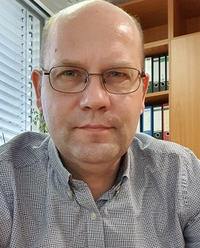Michael Schäfer
Experimental Traumatic Brain Injury

Traumatic brain injury (TBI) is one of the leading causes of death and disability. It can result in permanent neurological impairment and increases the risk for neuropsychiatric disorders and chronic neurodegenerative diseases. Ageing is an important, but often overlooked, factor that influences the pathophysiology of TBI. Taking advantage of experimental TBI mouse models and various in vitro models, we study behavioural, histopathological and molecular determinants of TBI progression and their interaction with age and other contributing factors. A special focus is on the pre-clinical development of neuroprotective and anti-inflammatory therapies.
Positions held
- Since 2012: W2 Professor for Experimental Anesthesiology, University Medical Center of Johannes Gutenberg University, Mainz
- 2011 - 2012: Group leader, Department of Anesthesiology, University Medical Center of Johannes Gutenberg University, Mainz
- 2007 - 2011: Group leader, Institute of Anatomy and Cell Biology, University of Freiburg
- 2005 - 2007: Postdoctoral fellow, Institut de Neurobiologie de la Mediteranée, Marseille, France
- 2004 - 2005: Postdoctoral fellow, Max-Delbruck Centre for Molecular Medicine, Berlin
Education
- 2004: PhD in Biology, Max-Delbrück-Centre for Molecular Medicine, Berlin
- 2000: Diploma in Biology, Institute of Zoology, University of Heidelberg
Selected publications by Michael Schäfer
Wang Y, Wernersbach I, Strehle J, Li S, Appel D, Klein M, Ritter K, Hummel R, Tegeder I and Schäfer MKE (2022) Early posttraumatic CSF1R inhibition via PLX3397 leads to time- and sex-dependent effects on inflammation and neuronal maintenance after traumatic brain injury in mice. Brain Behav Immun, 106:49-66 Link
Hummel R, Ulbrich S, Appel D, Li S, Hirnet T, Zander S, Bobkiewicz W, Gölz C and Schäfer MKE (2020) Administration of all-trans retinoic acid after experimental traumatic brain injury is brain protective. Brit J Pharmacol, 177:5208–5223 Link
Krämer TJ, Hack N, Brühl TJ, Menzel L, Hummel R, Griemert EV, Klein M, Thal SC, Bopp T and Schäfer MKE (2019) Depletion of regulatory T cells increases T cell brain infiltration, reactive astrogliosis, and interferon-γ gene expression in acute experimental traumatic brain injury. J Neuroinflamm, 16:163 Link
Menzel L, Kleber L, Friedrich C, Hummel R, Dangel L, Winter J, Schmitz K, Tegeder I and Schäfer MK (2017) Progranulin protects against exaggerated axonal injury and astrogliosis following traumatic brain injury. Glia, 65:278–292 Link
Menzel L, Paterka M, Bittner S, White R, Bobkiewicz W, van Horssen J, Schachner M, Witsch E, Kuhlmann T, Zipp F* and Schäfer MK* (2016) Down-regulation of neuronal L1 cell adhesion molecule expression alleviates inflammatory neuronal injury. Acta Neuropathologica, 132:703–720 Link
(*indicates equal contribution)
